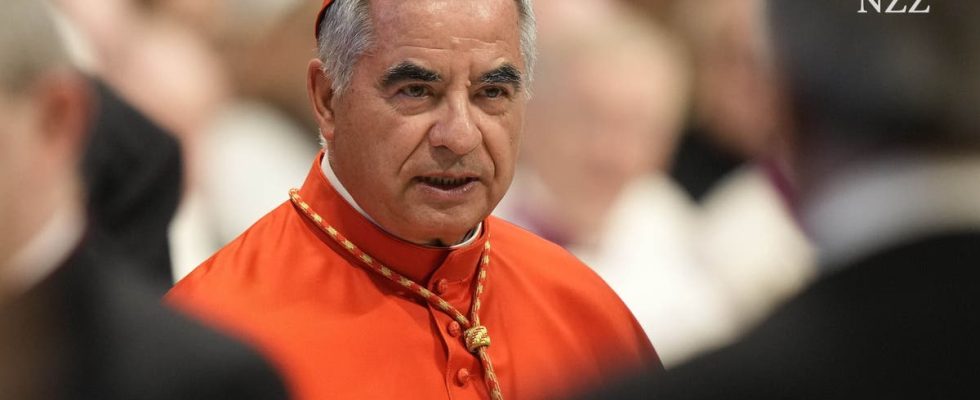The Vatican court passes a harsh verdict against the former number two in the papal secretariat of state. The Swiss René Brülhart gets away with a fine.
Convicted of crooked dealings: Cardinal Angelo Becciu.
After two and a half years, the trial surrounding the Vatican’s questionable real estate transactions came to an end on Saturday evening with the announcement of the verdict. The judges, presided over by Giuseppe Pignatone, handed down a harsh verdict in the case of Cardinal Angelo Becciu, the former number two in the State Secretariat.
The Sardinian cardinal was sentenced to five and a half years in prison and a fine of 8,000 euros. In addition, he is no longer allowed to hold any public – i.e. church – office for the rest of his life. The charge was seven years and three months in prison and a fine of 10,000 euros. The defense announced an appeal while still in the courtroom. Becciu was the first cardinal to appear before a Vatican court.
The cardinal was one of ten defendants in the Vatican financial scandal trial. The Swiss René Brülhart was also among the defendants. After Pope Benedict XVI. Having hired him as an advisor, Brühlhart was later appointed to the papal financial supervision, initially as director, later as president without operational tasks. At the end of 2019 he gave up his mandate in the Vatican.
Prosecutor Alessandro Diddi accused him, among other things, of abuse of office and demanded a prison sentence of three years and eight months and a fine of over 11,000 euros. The verdict was now much more lenient: Brühlhart was sentenced to a fine of 1,750 euros on Saturday for failure to act.
Financial and reputational damage
The trial essentially concerned a complex real estate deal that the Vatican conducted in the Chelsea district of London starting in 2014. By investing in a fund run by the financier Raffaele Mincione, the Vatican acquired a property measuring over 120,000 square meters on Sloane Avenue in two steps – but failed to acquire the corresponding rights to have a say.
The triple-digit million purchase turned out to be a flop; due to Brexit, the property lost dramatically in value. The State Secretariat finally acquired the missing voting rights through another financier for a further 15 million. In 2020, the Vatican decided to sell the property. Overall, the damage to the Vatican is estimated at up to 189 million euros.
In addition to the financial loss, there was also reputational damage: parts of the Peterspfennig also flowed into the business. This is a collection that takes place once a year in Catholic churches around the world. The amount of money collected on this day goes to the Holy See in Rome.
Whether, to what extent and to what extent crimes were committed was the subject of the long court hearings. A total of 86 days of negotiations were spent until the court reached its verdict.
Victim of a “theorem”?
The defense lawyers rejected Diddi’s accusations. Among other things, they complained that there had been inadmissible prior convictions. Pope Francis had already recommended that Cardinal Becciu resign from all offices in 2020 and take away all the powers associated with the cardinalate.
Becciu’s lawyers viewed this act and later statements by the prosecution during the trial as evidence that their client had become the victim of a “theorem”. Diddi was unable to provide any evidence of a crime. The court now saw things differently. Becciu was guilty of embezzlement.
What is certain is that the process revealed glaring deficiencies in the State Secretariat. Not only did those responsible lack professionalism – the London deal, for example, was apparently never legally clarified – they also made other questionable financial decisions.
Becciu is also said to have benefited relatives in Sardinia and also arranged for over half a million euros to be paid out to a woman who promised to help free hostages in Mali. According to the prosecution, she spent the money on luxury goods.
Order your finances
The Vatican and Pope Francis personally supported and encouraged the process. For them, it is part of their efforts to bring order to the financial budget and administration of the Holy See. Already in 2020, Francis withdrew power over property and financial transactions from the State Secretariat and other administrative units. Since then, only the Vatican property administration and the Vatican bank IOR have been allowed to invest money.
However, despite the historic process surrounding the London Deal, the mini-state in Rome is still a long way from having a culture based on the rule of law like in other countries. The Pope is still the absolute monarch in the Vatican. He is head of state, supreme judge and supreme legislator at the same time and can intervene in relevant procedures and decisions at any time. At the beginning of the Sloane Avenue investigation, he made use of this privilege – to the horror of the defense attorneys.
The announced move to the next instance, the Vatican Court of Appeal, is likely to bring further clarification.

